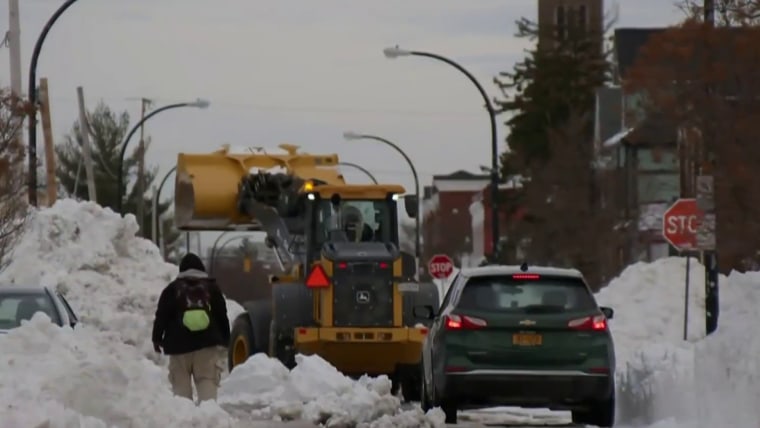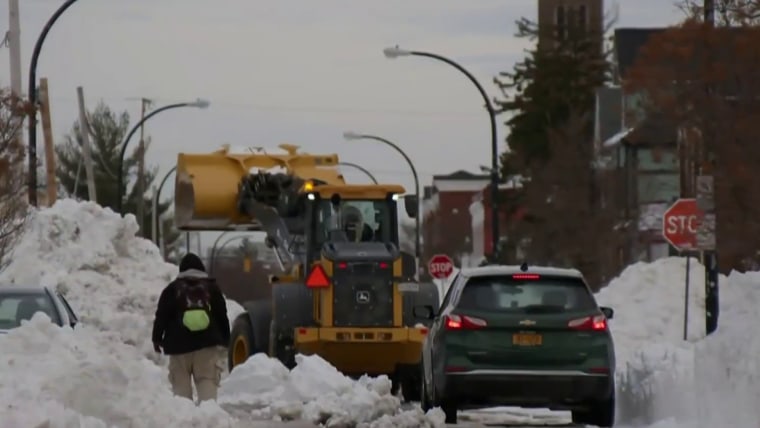Blizzards are the hurricanes of the north. Both blizzards and hurricanes are unstoppable forces that threaten everyone in their paths. To expect Buffalo to better withstand a blizzard because it snows a lot is to believe Seattle can shrug off any hurricane just because it rains there a lot. Blizzards combine snow with deadly cold, sustained winds and blinding whiteout conditions, turning the familiar into a blank alien landscape that can kill anyone unlucky enough to get caught out in it. One key to preventing such deaths is early decision-making, so recent events in Buffalo create an important moment to reflect on how this might best be done in the future.
While we should hold leaders accountable, we shouldn’t expect our leaders to personally risk embarrassment when making the safest choices on our behalf.
Life-threatening emergency conditions are notorious for their tipping points, when things suddenly get much worse through a cascade of unwanted events. Snow is a great example of this. If snowplows lose their fight with the storm, we haven’t simply lost emergency services during that storm, we’ve now lost them for days after the storm: When the storm does stop, it takes days of nonstop, heavy, dangerous work to unpack snowbound streets.
During this time, new chains of bad events threaten to make things even worse. For example, the road-clearing fleet is steadily burning through fuel, but nearby gas stations can’t provide that fuel when they can’t receive it over the snowbound roads the equipment is trying to clear. The clock is also ticking for supermarkets, which rely on daily deliveries to keep shelves stocked. The possibility of food shortages, especially in densely populated areas, is a real danger until a minimum number of roads are excavated and safe for delivery trucks.
Any leader making decisions in an emergency wants to ward off this compounding harm if at all possible. Buffalo, unfortunately, lost part of that fight during the December 2022 blizzard, losing dozens of its citizens to the storm and enduring blocked streets for days afterward. Right now, immediately after the storm, it is important to take time to mourn. Moving forward, it is important to learn as much as we can from the loss.
To do so, we need to recognize a very particular kind of decision that leaders often face in emergencies, a high-stakes choice that must be made early to prevent the first domino from falling and triggering a string of other problems. In Buffalo, that early decision is when to close roads before the blizzard’s arrival. (Mandatory evacuations are another example for other types of emergencies.)
When a snow emergency is closing in, why do we close roads? To keep them open. In the face of epic snowfall, most city snowplows can clear snow faster and stay in the fight longer if they don’t get stuck behind smaller vehicles struggling through the same conditions. Keeping roads open means emergency services can respond throughout the storm, including utility crews fighting off power outages, and everyone gets back on the road immediately after. Keeping smaller vehicles off the roads also keeps drivers safely inside, away from blinding blizzard conditions.
The experience of Buffalo, sadly, shows the alternative scenario. So far, 40 people throughout the area are known to have been lost to this blizzard. Four were found in their stranded cars and 17 were found in the open, presumably leaving a stranded vehicle behind or struggling on foot because they could not free their vehicle to drive someplace they very much thought they needed to be. At least three people died because an ambulance could not reach them, and 11 others died in their homes as the power failed and the utility crews could not respond.
It’s easy to say now that roads should have been closed earlier. But that decision wasn’t so simple because of the huge costs such closure incurs, especially if the emergency doesn’t materialize as forecast. Remember, the emergency itself is an uncontrolled condition: Like any weather system, the blizzard could have wobbled away from Buffalo and carved a path through forests and farmland to the south.
Anyone who announced a city driving ban only to see the storm shift away would be responsible for shutting down the region’s economy during some of the busiest shopping days of the year and separating loved ones trying to gather for holiday celebrations. Human nature alone suggests your decision maker might hesitate, even before you recognize that this person is usually an elected official whose job depends largely on staying popular.
What is the solution? We must depersonalize such decisions if we want better outcomes in the future. While we should hold leaders accountable, we shouldn’t expect our leaders to personally risk embarrassment when making the safest choices on our behalf. Accordingly, we depersonalize such decisions by converting them to preprogrammed rules of thumb that we do not stray from once set.
For example, we all agree that driving bans go into effect at a certain time before the projected arrival of a snowstorm of a certain probability of severity, based on data from an agreed upon source such as the National Weather Service. Emergency managers, analysts and policymakers take sufficient time under nonemergency conditions to identify, debate and finalize the exact amount of time and precise probabilities, but then the rule is set and everyone knows it. If a given storm steers south — in hindsight shutting down driving in the city “for no reason” — it isn’t the decision maker’s fault, it’s just the rule.
And by “we,” I mean each and every one of us. This system of protecting the first decision that blocks a domino-like cascade of harm doesn’t work unless we all pause in our normal lives and recognize this particular feature of emergencies. In other words, we need to support the rule that guards the first domino and follow it, for ourselves and our communities.
Source: | This article originally belongs to Nbcnews.com










